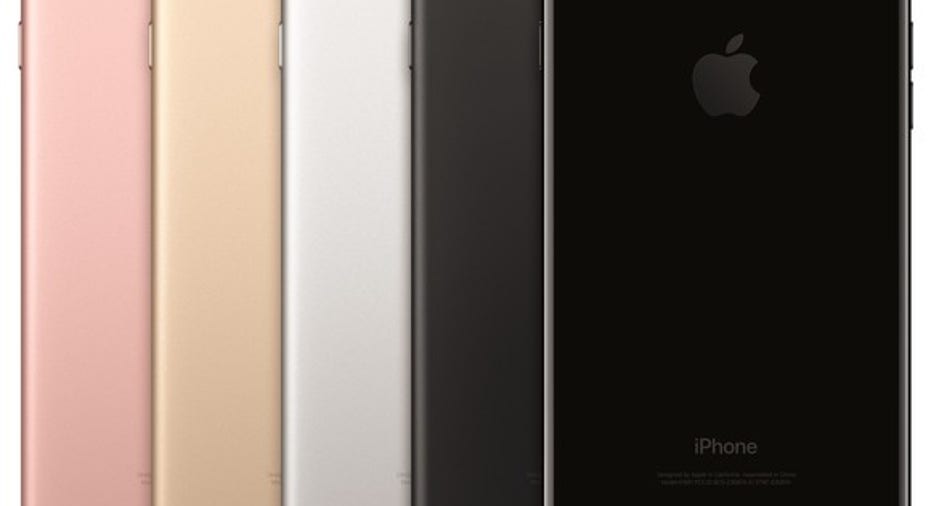1 Big Risk to Apple Inc. Stock

Even the most successful and well managed companies in the world face significant risks. To make good investment decisions -- and to avoid getting blindsided -- it's important to have a solid understanding of those major risks.
Image source: Apple.
In Apple's (NASDAQ: AAPL) latest form 10-K filing, the company describes many potential risks to its business. I'd like to go over one really important one.
A highly competitive market
Here's the second risk factor that Apple listed in its most recent form 10-K: "Global markets for the company's products and services are highly competitive and subject to rapid technological change, and the company may be unable to compete effectively in these markets."
Apple points out that it is "unique in that it designs and develops nearly the entire solution for its products," which necessitates "significant investments" in research and development.
"In contrast," Apple says, "many of the company's competitors seek to compete primarily through aggressive pricing and very low cost structures, and emulating the company's products and infringing on its intellectual property."
The company further explains that if it can't keep building "innovative new products with attractive margins or if competitors infringe on [Apple's] intellectual property," then its competitive positioning could be "adversely affected."
Though many investors have a lot of faith in Apple's product development abilities, this risk is hardly theoretical; it's playing out in the marketplace right now. Let's dig deeper.
"Aggressive pricing with very low cost structures"
Apple seems to suggest that "aggressive pricing" and "very low cost structures" go hand in glove. This is often the case, particularly in the low-end and mid-range of the smartphone, tablet, and PC markets.
Apple's products are generally regarded as premium in both quality and pricing, and thus it has a limited to nonexistent presence in these markets; its cheapest smartphone -- the iPhone SE -- starts at $399. Other companies sell competent smartphones for $150 or less.
To the extent that the market shifts to very low priced devices, Apple's competitive positioning weakens; Apple's margin targets don't allow the company to serve lower price points, and the company is unlikely to build extremely cost-sensitive smartphones for fear of diluting the premium iPhone brand.
However, there's another risk that Apple faces. Many of the smartphone makers that have built significant businesses at the low end of the market are now trying to participate in the mid-range and upper end of the market.
Some of these vendors, like China-based Meizu, try to offer devices with similar features and even aesthetics to Apple's flagships. For example, the PRO 6 Plus looks a lot like an iPhone and offers high-end specifications such as a fast processor, good camera sensors, and an OLED display, but it sells for the equivalent of about $480 -- about half the price of Apple's flagship iPhone 7 Plus.
The Meizu Pro 6. Look familiar? Image source: Meizu via The Verge.
It's not clear that Meizu can build an equivalent smartphone to what Apple can at a lower bill-of-materials cost. However, Meizu's operating expenses are probably substantially lower than Apple's for a variety of reasons. Apple does more in-house technology development and performs significant R&D work in relatively high-cost regions, for example.
It's also worth noting that Apple's investors expect the company to be able to generate robust gross profit margins, while Meizu and other competitors probably don't target anywhere close to that gross profit margin level.
"Emulating the company's products"
There are many smartphones sold, particularly in China, that look a lot like Apple's iPhones. In fact, there are companies that sell straight-up iPhone clones, albeit with far lower quality software and much weaker hardware.
Additionally, there are phones that look extremely like Apple's iPhone out there and are sometimes marketed in a way that closely resembles Apple's own marketing campaigns. (Here's an example).
Make no mistake: Apple must compete against such companies to win business. The company has done a good job competing thus far, but even it tells investors that "there can be no assurance that the company will be able to continue to provide products and services that compete effectively."
10 stocks we like better than Apple When investing geniuses David and Tom Gardner have a stock tip, it can pay to listen. After all, the newsletter they have run for over a decade, Motley Fool Stock Advisor, has tripled the market.*
David and Tom just revealed what they believe are the 10 best stocks for investors to buy right now... and Apple wasn't one of them! That's right -- they think these 10 stocks are even better buys.
Click here to learn about these picks!
*Stock Advisor returns as of Nov. 7, 2016
Ashraf Eassa has no position in any stocks mentioned. The Motley Fool owns shares of and recommends Apple. The Motley Fool has the following options: long January 2018 $90 calls on Apple and short January 2018 $95 calls on Apple. Try any of our Foolish newsletter services free for 30 days. We Fools may not all hold the same opinions, but we all believe that considering a diverse range of insights makes us better investors. The Motley Fool has a disclosure policy.



















